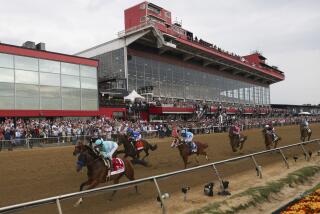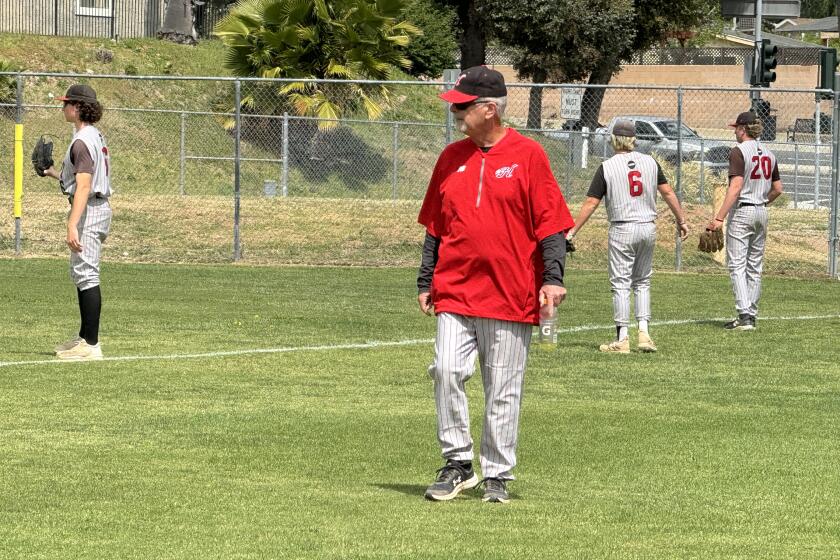BASEBALL / ROSS NEWHAN : Arizona Fall League Gets Off to Fast Start
The Arizona Fall League is running like clockwork in its first season--a goal in more ways than one.
By implementing some simple concepts, the Arizona league has cut more than half an hour off the average time of games at the major and minor league levels.
“The hope is that these kids will carry it on to the big leagues,” said Mike Port, the former Angel general manager who is president of the six-team league that features top minor league players from every major league franchise except the new Colorado Rockies and Florida Marlins. “I think they’ve learned that they can play the game with the same intensity but have more fun at it if it moves along.”
The average American League game in 1992 lasted 2 hours 53 minutes. The National League average was 2:45. The minor league average was 2:48. The Arizona average is 2:25, a five- to 10-minute falloff from earlier in the 54-game season when the weather was warmer, the umpires seemed more conscious of following the new guidelines and the players weren’t as tired after a full summer season.
“Generally, we’d been playing them in 2:15, 2:17, and some under two hours,” Port said, huddled against the chill during a recent night game. “A worst-case scenario for a nine-inning game was 2:25.”
The slow pace of major league games was a major concern to former commissioner Fay Vincent, who hoped to have a summit meeting of players, umpires and club officials this winter to discuss remedies. Vincent’s forced resignation scuttled plans for the summit, but the time issue was discussed by general managers and farm directors during their recent winter meetings. It gave hope, said Bill Murray, the major league’s executive director of baseball operations, that some of the things being done in Arizona, can be “codified and carried over to spring training.”
“We’ve got to start getting the people who go to games home in time to see the highlights on the news,” Murray said. “For the most part, the only people getting home in time now are those that leave the games early. It doesn’t take much. If you can knock off five seconds per pitch, that equates to almost a half hour per game.”
The Arizona league was created by baseball as a domestic alternative to the Caribbean winter leagues. Although the Arizona league has drawn poorly, Port believes that with more marketing time it can grow to the level of a triple-A operation. Scouts have been raving about the concept--from the quality of play, to the time of games, to the convenience of avoiding a long trip to the Caribbean.
“Being a new league, we were the right stage, the right laboratory, to try some new concepts,” Port said, referring to the attempt to shorten games. “At the same time, we didn’t want to get into anything terribly experimental. If it could be done within the context of the game, fine, but we didn’t want bells going off as a penalty. As it is, we didn’t get into hard and fast rules as much as simply encouraging the guys to hustle, which they’ve done.”
Of the concepts, only two are rigid:
--Games start on time.
--No more than 90 seconds between innings.
In addition, hitters are asked to keep one foot in the batter’s box between pitches, which has stopped the roaming and stimulated the pitcher to work faster, creating a better flow for the fan and a better sense of command for the pitcher, Port said. The on-deck hitter is also asked to be ready, to be moving toward the plate once a determination has been or is being reached on the batter.
“It’s a matter of a few seconds here and there,” Port said. “Physically, there’s no reason it can’t be done at the major league level, but there have been some bad habits formed. The mode is to be fashionably slow rather than quick, and any changes have to evolve from a cooperative spirit. The players, the umpires and the clubs have to decide what’s good for the game and the fans.”
Cooperation in all things is not exactly a baseball byword.
--Umpires are unwilling to accelerate games by calling the high strike as outlined in the rule book because of abuse they will take from hitters and managers and are unwilling to become timekeepers by implementing rule 8.04, which calls for the pitcher to deliver the ball every 20 seconds when there is no runner on base or be penalized by the calling of a ball.
--Hitters and pitchers both are unwilling to break dawdling habits that have carried down to Little League.
--Clubs are unwilling to intrude on commercial time by reducing or even strictly enforcing time between innings and also strictly enforcing starting times.
They are all cooperating in Arizona, but will it carry into spring training and the season? The times will tell.
More to Read
Get our high school sports newsletter
Prep Rally is devoted to the SoCal high school sports experience, bringing you scores, stories and a behind-the-scenes look at what makes prep sports so popular.
You may occasionally receive promotional content from the Los Angeles Times.






